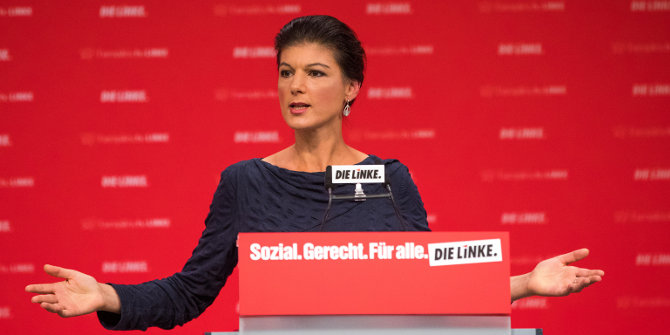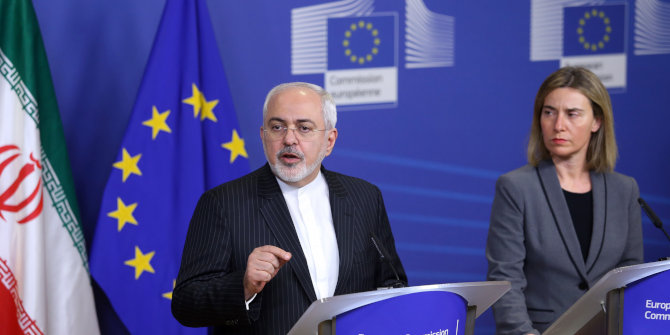 Facing the rise of the radical right AfD, some key left-wing figures in Germany have initiated ‘Aufstehen’, a new self-proclaimed movement which will officially be launched on 4 September. Manès Weisskircher discusses the players behind Aufstehen, their goals, and the movement’s future prospects.
Facing the rise of the radical right AfD, some key left-wing figures in Germany have initiated ‘Aufstehen’, a new self-proclaimed movement which will officially be launched on 4 September. Manès Weisskircher discusses the players behind Aufstehen, their goals, and the movement’s future prospects.
In Germany, as elsewhere in Europe, left-wing political players are in a dire state. At the beginning of 2018, after an extensive intra-party struggle, the German Social Democrats (SPD) joined another Merkel government – despite being granted only a few substantive policy concessions. Ever since then, the party has polled below its record low of 20.5 percent in last September’s Bundestag election.
While the radical left Die Linke has stabilised at almost 10 percent of the vote more than a decade after its foundation, the party lacks any hope of participating in national government for the foreseeable future. Moreover, in its long-term strong hold of the eastern Neue Bundesländer, the former GDR, the radical right AfD has started to perform particularly well.
Since 2005, the Greens have been the smallest parliamentary party. In recent months, however, they have climbed steadily in the polls, up to 15 percent, and not too far behind the SPD. This at least temporary rise in support was preceded by a leadership change: for the first time, with one brief exception, both Green co-leaders are now moderate ‘Realos’ – without any left-wing ‘Fundi’ being represented at the top of the party.
Together, all three parties convinced just 38.6 percent of voters to support them in the 2017 federal election – some distance away from a left-wing majority. The stated goal of Aufstehen (perhaps translated best as ‘rise up’ and also referred to as ‘#aufstehen’) is to change this constellation and to move German politics to the left. But who is behind Aufstehen, what do they want, and what are their prospects?
Who are the main players behind Aufstehen?
While political scientists have lately focused on the (re-)emergence of ‘movement-parties’ – social movements institutionalising as political parties – Aufstehen seems to be a ‘party-movement,’ with politicians trying to launch an active ‘civil society.’ Key players within Die Linke have initiated Aufstehen, most notably Sahra Wagenknecht, co-leader of the parliamentary group. Wagenknecht grew up in the GDR, but for a long time already her political base has been in the west. At last year’s Bundestag election, she was one of two leading candidates.
Nevertheless, she has often been opposed within her own party, partly due to a long association with the Kommunistische Plattform, a small intra-party group, and also due to her past criticism of the party’s performances in regional government. Wagenknecht’s rise through the ranks came with her abandoning her previous self-designation as ‘communist’ and giving praise to Ludwig Erhard, the CDU minister of economics during the ‘economic miracle’ of the 1950s. Still, on most issues Wagenknecht has remained to the left of many of her fellow party members.

Sahra Wagenknecht, Credit: Die Linke (CC BY-NC-SA 2.0)
A second key organiser is Oskar Lafontaine, formerly not only a party leader of Die Linke, but also of the SPD. Lafontaine, Wagenknecht’s husband, was one of the ‘founding fathers’ of Germany’s first Red-Green coalition in 1998, together with Gerhard Schröder and Joschka Fischer. However, he soon broke with the government over its planned social and economic policies, resigning as finance minister after merely six months. Coming from Saarland, Lafontaine is a well-known Francophile and friends with Jean-Luc Mélenchon, whose relatively successful 2017 presidential campaign with La France Insoumise he followed closely.
The formal head of the registered association behind Aufstehen is theatre-maker Bernd Stegemann. Last year he published a book on populism, calling for a ‘self-criticism of liberalism’ as ‘the only solution’. The political economists Wolfgang Streeck, a former SPD member who left when the party failed to expulse anti-immigration ideologue Thilo Sarrazin, is another active supporter. In recent years, Streeck established himself as a critic of neoliberal capitalism, and especially of Eurozone politics. Recently, he also put forward a critique of liberal immigration policies. Another proponent of Aufstehen is Peter Brandt, historian, SPD member, and son of the former German chancellor Willy Brandt (1969-1974).
While one of the stated aims of Aufstehen is to unite left-wing forces, so far only fringe or retired politicians from other parties have announced their involvement. The best-known SPD participant is Bundestag deputy Marco Bülow, a left-wing backbencher who was among the few within his party to vote against the third bailout programme for Greece in 2015. The most prominent Green face is Antje Vollmer, first ever Green vice president of the Bundestag (1994-2005). When the Greens governed with Schröder’s SPD, Vollmer criticised her own party, rejecting policies such as the German involvement in the war in Afghanistan.
Leading SPD and Green politicians have reacted negatively to Aufstehen. But the self-proclaimed ‘movement’ is also opposed by some within Wagenknecht’s Die Linke. To a significant extent, the main ideological cleavage within the party corresponds to a geographical one: its branches in the Osten tend to be more moderate. There, the party has sometimes received support of more than 20 percent in regional elections.
In the eastern German region of Thuringia, Bodo Ramelow even heads a Red-Red-Green coalition – he is the first ever Ministerpräsident of his party. A regional politician close to Ramelow, Benjamin Hoff, has publicly dismissed Aufstehen. But also politicians from the Westen, such as Bernd Riexinger, co-head of Die Linke, have emphasised that ‘this is not a project of the party Die Linke… it’s a project of individuals.’
What are their stated goals?
At the moment, Aufstehen does not have its own public manifesto yet. Instead, on its website a great variety of individuals – such as a soon-to-be teacher, a car mechanic, a DJ, a journalist, and a retired hairdresser – talk about classic left-wing issues. These include employment, housing and pensions, but also global warming, animal welfare, education, and anti-racism. As strategic aims, Wagenknecht and Lafontaine have frequently emphasised their wish to stop the rise of the AfD and to rebuild left-wing majorities. All these goals are likely to have broad appeal among sympathisers of the left.
The one issue that has divided the German left since the intensification of the ‘refuge crisis’ in Germany is immigration. It will be the most controversial issue to agree upon for participants in Aufstehen – as the well-known left-wing journalist Jakob Augstein, among others, has highlighted. Many declared supporters of Aufstehen have criticised liberal immigration policies. The political economist Martin Höpner has cited a lack of understanding of labour migration as a social issue, and its effects on the labour market, housing, and education, within the left. Wagenknecht herself has rejected calls for ‘open borders for everyone’ as ‘unworldly’ and referred to ‘capacity limits and limits of the readiness of the population.’ For such positions, she received not only a lot of criticism from other parties, but also her own one. At a party congress in 2016, an anti-fascist activist threw a pie in her face.
To some extent, the sharp divisions over immigration within the German left are based on form rather than substance. All relevant left-wing parties struggle with the extent to which regulation of immigration is morally justified and how to implement it. When in office, they go with the flow: the SPD is following the restrictive immigration agenda of the Große Koalition, driven mainly, but not only, by the Bavarian CSU. It is likely that the Greens would have acted similarly if the liberal FDP had not brought down last year’s Jamaica coalition negotiations – concessions during these talks and some of their actions in subnational government indicate that. And only this month, Die Linke in Brandenburg, as junior partner of an SPD-led coalition, failed to prevent the deportation of three individuals to Afghanistan.
In political debates within the left, many of those who emphasise the regulation of immigration describe the position of others as ‘naïve’, or worse ‘neoliberal’. At the same time, many of those who highlight freedom of movement describe other positions as ‘nationalist,’ or worse ‘similar to the AfD’. Such distinctions underline that reconciliation will be difficult – how to approach the issue of immigration will be crucial for Aufstehen’s desire to act as ‘Sammlungsbewegung’ (perhaps translated best as ‘coalition movement’).
Future prospects
In many Western European countries, radical left parties are established players, some of them with considerable electoral strength. However, their recent political impact as junior partners in government coalitions has been modest. Only a few examples of limited political influence, for example at the local level, exist. And even when radical left parties lead national governments, their electoral success does not automatically translate into policy gains, as Cas Mudde has discussed in the case of Syriza. In short, radical left players do not lack discouraging examples.
For a movement to be successful, it is key to make allies. However, reaching out to some prominent German left-wingers will be difficult, and not only because new organisations are never particularly welcomed by existing ones. For some politicians of the left, Wagenknecht and Lafontaine are highly polarising figures. Kevin Kühnert, the main face of intra-SPD opposition to the formation of another Große Koalition, has already publicly dismissed Aufstehen. And as far back as January, the Institut Solidarische Moderne, an existing platform of politicians from the SPD, Greens, and Die Linke that has never reached a broader audience itself, rejected top-down plans for a left-wing Sammlungsbewegung.
At the same time, Wagenknecht and Lafontaine have proven to be effective politicians on multiple occasions – and they certainly have some room for manoeuvre. One short-term prospect for Aufstehen may be to use any initial momentum to campaign for selected popular left-wing demands that their critics within the SPD, Greens, and Die Linke would have a hard time rejecting. Even merely putting left-wing issues on the agenda would already signify a substantive shift of contemporary public discourse in Germany.
Dieter Rucht, a renowned social movement scholar, suspects that Aufstehen might result in the foundation of a political party – at the same time, however, he does not see any space in the party system that would allow for its successful establishment. So far, Wagenknecht has firmly denied any such plans. Still, a recent survey reports that one third (34 percent) of all Germans would ‘consider’ voting for a (non-existing) Aufstehen party. Almost all supporters of Die Linke (87 percent), half of the Green supporters (53 percent), and more than a third of SPD supporters (37 percent) wouldn’t rule it out. While such a vague poll must be taken with more than a pinch of salt, it may at least show that there is some interest for a new left-wing political player among the German population.
On 4 September, Aufstehen will have its official launch event. Then, its first plans on specific issues, forms of actions, and further supporters will be announced. In its first weeks of online presence, close to 100,000 individuals have signed up. In comparison, Die Linke has a declining membership of around 60,000. To what extent those who registered online are going to shape the development of Aufstehen ‘from below’ is currently unclear. But active participants will be decisive for the initiative’s ability to influence German politics.
Please read our comments policy before commenting.
Note: This article gives the views of the author, not the position of EUROPP – European Politics and Policy or the London School of Economics.
_________________________________
 Manès Weisskircher – TU Dresden / European University Institute
Manès Weisskircher – TU Dresden / European University Institute
Manès Weisskircher is a is a researcher at the TU Dresden (MIDEM — Mercator Forum Migration and Democracy) and at the European University Institute in Florence. His research interests include comparative politics and political sociology. He tweets @ManesWeissk






They may not yet have a manifesto but seem to be just another group of lefties peddling the same tired and discredited rubbish that these left and far left groups always prattle on about.
They and the Libs have had their moment in the sun, where they, as usual, have created a complete mess which others have to clean up. Thankfully the voters have tired of their lies and deceit and are electing people who care about the same issues that they do to represent them.
Long may it last.
To answer the question at the head of this article, which asks – Will Germans rise up for a new left-wing movement? Hopefully they have more sense than to do so.
Meh, the types like alt.right, Saxonians, Pegida/AfD will rule it out? Go and get a Life!
“Go and get a life”? very imaginative, you wouldn’t be just virtue signalling would you?
The impression I get at the moment is that “Aufstehen” is essentially a Sahra Wagenknecht fan club. It doesn’t necessarily follow that it is a bad thing, there are certainly worse people to be a fan of than Sahra Wagenknecht. It would not surprise me if many of its supporters are those who have read popular books of hers like the recent “Reichtum ohne Gier”, which criticises the rent-seeking upper 1% of society and advocates changing the ownership structure of large private monopolies (like Google or the water company) so that they are run by worker representatives and state nominees, and if “Aufstehen” ends up taking similar positions.
My guess is that Sahra Wagenknecht would like “Aufstehen” to have a similar dynamic to Momentum. Of course the difference is that Momentum is at least supposed to be part of the UK Labour Party, while “Aufstehen” is supposed to be cross-party. But as you say, “Aufstehen” has very little traction in parties other than Die Linke anyway. And it’s hard to see how it can ever have traction, if perceived as a Wagenknecht fan-club, just as Liberal Democrats are unlikely to want to sign up to Momentum.